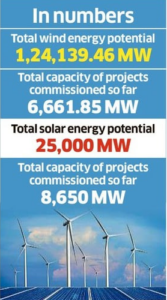Published on: April 14, 2025
KARNATAKA’S AMBITIOUS RENEWABLE ENERGY PLAN FOR 2030
KARNATAKA’S AMBITIOUS RENEWABLE ENERGY PLAN FOR 2030
NEWS – Karnataka is set to launch an ambitious initiative to establish solar-cum-wind power plants with common battery storage and transmission infrastructure. The goal is to generate close to 19,000 MW of renewable energy, tapping into the state’s unexploited energy potential. Below are the key details of this plan.
HIGHLIGHTS
Overview of the Renewable Energy Plan
- Karnataka aims to develop solar and wind power plants totaling nearly 19,000 MW.
- The plan includes the integration of battery storage systems and transmission lines.
- The target completion date for this initiative is 2030.
Hybrid Energy Model
- Integration of Solar and Wind Power:
- Solar power generation peaks in the morning, while wind power generation is high in the evenings.
- A hybrid model will be adopted to combine both sources, optimizing energy production.
- Battery and Pumped Storage Systems:
- The state will incorporate storage systems to address peak-hour shortages and excess power during non-peak hours.
Distribution of Power Projects
- Focus on North Karnataka:
- Approximately 15,000 MW of the total 19,000 MW will be concentrated in north Karnataka.
- Key districts include Belagavi, Koppal, Raichur, Chitradurga, Gadag, and Haveri.
- Land and Infrastructure Preparation:
- The state has already identified land in potential districts for the projects.
- Negotiations with farmers in many areas have been completed.
- Public Private Partnership (PPP):
- Some projects will be undertaken under the PPP model to encourage private sector participation.
Assessment of Wind and Solar Energy Potential
- Wind Energy Potential:
- A study by the National Institute of Wind Energy (NIWE) in 2021 assessed Karnataka’s wind energy potential at 1.24 lakh MW.
- However, only 1,806 MW of wind energy projects have been commissioned so far.
- Solar Energy Potential:
- The National Institute of Solar Energy (NISE) estimates the state’s solar power generation potential at 25,000 MW.
- Currently, around 8,650 MW of solar energy projects have been commissioned.
Challenges and Timeline
- Long Implementation Timeline:
- According to K.P. Rudrappaiah, Managing Director of Karnataka Renewable Energy Development Limited (KREDL), implementing such large-scale projects requires careful planning and obtaining numerous permissions, which can take time.
- Progress and Expectations:
- Despite the slow pace, Karnataka remains one of the top five states in India for renewable energy generation.

